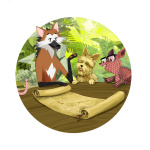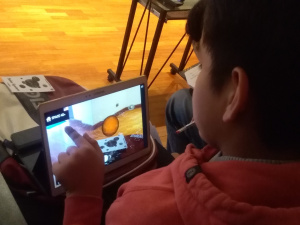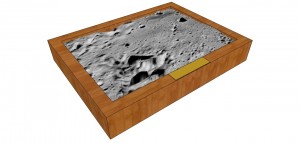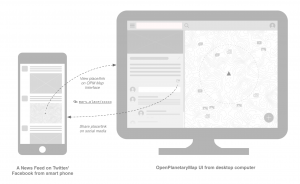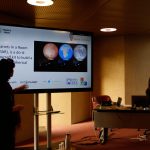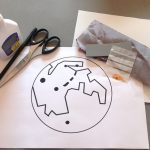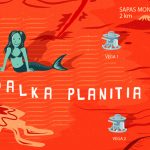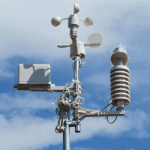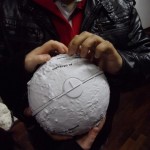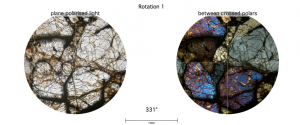Projects funded in 2023 | 2022 | 2021 | 2020 | 2019 | 2018 | 2017 | 2016 | 2013 | 2012 | 2011 | 2010
2023 Funded Projects
A Blink of a Star: An Occultation Citizen Science Project
Sociedad Astronómica Granadina
Award: 4,700 Euros
The study of occultations of stars by Solar System bodies provides relevant data about those bodies (sizes, atmosphere, moons, rings…) and the occulted stars. Therefore it is of great interest to observe those events. However, those occultations can only be observed in certain regions of the Earth: those which are within the shadow path of the occultation.
On Dec 12th, 2023, Asteroid (319) Leona will occult Betelgeuse (Alpha Orionis), a very bright star in Orion. In this case the great interest is to study the star Betelgeuse with an unprecedented spatial resolution given that the angular diameter of Betelgeuse is very similar to that of Leona. This occultation will be easily visible with the naked eye on various places on Earth, a phenomenon that is not common and offers a great opportunity for outreach about these phenomenons and the science involving their study. Particularly, as it will be visible in the north of Andalusia, near to the headquarters of the Sociedad Astronómica Granadina (SAG), SAG requested support from Europlanet for a citizen science project to obtain numerous different chords using regular cameras and lenses to complement the professional observations of the event and an outreach campaign in order to engage the public with the science behind those phenomenons.
2022 Funded Projects
A Journey to the Planets
IAGA-International Association of Geomagnetism and Aeronomy group at GFZ-Potsdam and Papa Vento
Award: 5,000 Euros
‘A Journey to the Planets‘, is a project to produce a series of short movies aimed at young children (2-8 years) with stories about the planets told by Bimbim’s team, an original and funny puppet theatre. Find out more.
2021 Funded Projects
The San Agustin Remote Observatory
San Agustin Educational Foundation (FESA), Bolivia.
Award: 4,500 Euros
The San Agustin Remote Observatory in Cochabamba will provide remote-access to support astronomy outreach in Bolivia. Find out more.
ExoWorld Walk
Romanian Academy of Sciences, Cluj-Napoca Branch, Romania.
Award: 1,000 Euros
The ExoWorld Walk through the Botanical Gardens of Cluj- Napoca, Romania connects the surroundings to astrobiology and convey the message: ‘We are all special, there is no Planet B!’
2020 Funded Projects
Amanar: A refuge in the Stars
GalileoMobile, University of Leiden.
Award: 8,000 Euros
“Amanar: A refuge in the Stars” is an outreach project to inspire the Sahrawi community through the wonders of our Universe and promote peace, mutual understanding and a sense of global citizenship under the same sky. Find out more
Sense the Universe
Cardiff University, UK
Award: 6,960 Euros
“Sense the Universe” is a project to create re-producable resources for home and school environments targeted at people with special educational needs (SEN).
MOMSTER: MObile Meteor STation for Education & outReach
Royal Belgian Institute for Space Aeronomy (BIRA-IASB),Belgium
Award: 5,000 Euros
MOMSTER: MObile Meteor STation for Education & outReach is a resource for STEM teachers in secondary schools to observe and to learn all about meteors and their impact on the Earth’s atmosphere and the planet. Find out more
2019 Funded Projects
Help your Alien – A Solar System Game
Instituto de Astrofísica e Ciências do Espaço, Portugal
Award: 7,500 Euros
‘Help your Alien’ is a multilingual board-game targeted at 6-12 year old children. Players must help Solar System back-packer aliens to return home, using the aliens’ physiological features to identify which planets and regions within the planet they come from. The game is being developed by the Science Communication Group of the Instituto de Astrofísica e Ciências do Espaço (IA), Portugal and will be designed and tested through an iterative process where feedback from children and families will be integrated into revisions to create a final version of the game. Free copies will be distributed to schools, science centres and museums. The game was released in January 2023. Find out more about how to access the online version (in English and Portuguese)
Heritage in Space
Beyond the Earth Foundation, UK
Award: 3,000 Euros
‘Heritage in Space’ is a project to develop an online, pilot interactive platform for audiences across Europe to contribute their experiences, memories and contemporary observations of planetary spacecraft in order to collectively identify objects which possess intrinsic ‘space-heritage’ significance.
Confessions of History… of science
NCCR PlanetS, Bern University, Switzerland
Award: 6,000 Euros
‘Confessions of History… of Science’ will produce a pilot video about the understanding of planets throughout history: from ancient times (Aristarchus of Samos, Claudius Ptolemy, etc.) to Renaissance (Giordano Bruno, Nicolas Copernicus, etc.), up to the present day with the discovery of exoplanets (Otto Schmidt, Michel Mayor, etc.). The video will be a spin-off from the award-winning series, Confessions d’Histoire, and will thus take the shape of humoristic yet historically/scientifically accurate interviews with historical figures (interpreted by professional actors) and contemporary figures (as themselves).
Space Days 2019: Around the Moon
Danish Astronautical Society, Denmark
Award: 3,500 Euros
‘Space Days 2019: Around the Moon in the Round Tower’ is an exhibition in the famous Round Tower in Copenhagen, the oldest functioning observatory in Europe, that will be held from October 4th – November 3rd. The exhibition will be a walk around the Moon in the center of the exhibition room following a timeline from the past (1950) and into the future (2050). On the journey the audience will learn about the formation, geology and topography of the Moon and about in-situ resources and the plans of returning to the Moon and later to Mars.
2018 Funded Projects
Connacht Schools Planetary Radio Telescope Network
National University of Ireland, Galway
Award: 7,500 Euros
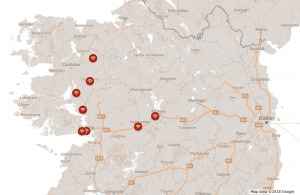
The Connacht Schools Planetary Radio Telescope Network will install eight dual dipole antenna radio telescopes on the grounds of rural secondary schools in Ireland. Each radio telescope will be used by teachers and students to observe the aurora of Jupiter, and contribute to the larger network of NASA’s Radio Jove facilities used to monitor the giant planet’s active magnetosphere. The ‘temperate’ Irish climate is ideally suited to these observations and the low population density around Galway means that there is limited radio-frequency interference. Each observatory will feed real-time data to a server at the National University of Ireland.
2017 Funded Projects
Planets in Your Hands
National and Kapodistrian University of Athens / Department of Physics
Award: 7,000 Euros
‘Planets in Your Hands’ is a project to construct models of planetary surfaces in square frames, giving a visual and tangible representation of a wide range of environments in our Solar System. These models will form a portable exhibition that will travel to schools, universities and private institutes and organisations. Visitors will have the chance to see, touch and have a sense of each surface, where the basic planetary characteristics will be given. For example, large temperature difference on Mercury, high temperature on Venus, the red colour of Mars, the gaseous and windy giant planets will be modelled, by utilising special materials for surface structure, warm and cool air (fans), gaseous and cold surface (dry ice), and special LED illumination effects. The project will be complemented with a specially developed website, including information about the Solar System and the exhibited planets.
The project will target people who are interested in virtual tours on our Solar System and it will be carefully designed for children and visually impaired audiences, in order to “feel” the planetary surfaces and have the impression of the wide variety of surface, landscape characteristics, size and scale, as well as environmental properties.
Find out more: http://www.planetsinyourhand.phys.uoa.gr/
OpenPlanetaryMap – Places on Mars
SpaceFrog Design
Award: 10,000 Euros
OpenPlanetaryMap is a mapping and social platform for space enthusiasts and students, planetary researchers and mappers, educators and story tellers. This collaborative project will create and share location-based knowledge and maps of others planets in our Solar System. A web map interface will make it easy and enjoyable for novice people to discover, search, share, discuss and add their own Places on Mars. As the underlying data sets of the interactive map will be curated and used by planetary researchers, the project will also create a direct link with and between planetary researchers. Along with the basemaps, these scientifically accurate data sets will easily be accessible and reusable by others to develop new applications or interactive maps for specific scientific or outreach purposes. http://openplanetary.org/
2016 Funded Projects
Planets in a Room
Speak Science
Award: 15,000 Euros
Teaching planetary science using a spherical projector to show the planets’ surfaces is a very effective but usually very expensive idea. Whatsmore, it usually assumes the availability of a dedicated space and a trained user. “Planets in a room” is a project made by the non-profit association Speak Science to build a low cost version of a small, spherical projector that teachers, museum, planetary scientists and other individuals can easily build and use on their own, to show and teach the planets. This proposal, aimed at bringing planetary science to a larger audience, was awarded €7,500 by the Europlanet Outreach Funding Scheme in 2016, and a further €7,500 in 2017 to complete the project following the demonstration by Speak Science of a working prototype at EPSC 2017.
More about Planets in a Room
2013 Funded Projects
Meet our neighbours! – A tactile experience
NUCLIO
Award: 6,000 Euros
For 2013, an award of 6,000 Euros supported the not-for-profit NUCLIO Foundation in Portugal to produce ‘Meet our neighbours!’, a set 13 tactile images of the main objects of the Solar System. Through dedicated hands-on low cost activities, this project aims to be used in science centres and outreach associations across Europe, and is targeted at visually impaired children from the ages of 6 to 12 years old. The resources are now available as educational activities on astroEDU (Sun, Moon, Earth)
NEO Search Campaign
IASC Data Reduction Team (Slovakia/Italy), NUCLIO
Award: 8,000 Euros
For 2013, an award of 8,000 Euros supported an online educational outreach, citizen science program for the general public to have the opportunity to make original discoveries of near-Earth objects (NEOs). On a nightly basis, depending upon the bright Moon and weather, image sets from the Astronomical Research Institute (ARI) Observatory (Minor Planet Center, Observatory Code H21) were provided online. Taken with either the 0.61-m, 0.76m or 0.81-m prime focus telescope, the general public could blink the stacked and tracked images looking for faint, undiscovered NEOs in the background.
Gaming a better Environmental Understanding
Astrosphere New Media Association
Award: 6,000 Euros
For 2013, an award of 8,000 Euros supported the development of multiplayer games to teach environmental science and planetary environments to target audiences of teenagers, adults, and the visually impaired.
2012 Funded Projects
Planetary Maps for Children
Eötvös Loránd University
Award: 5,700 Euros
In 2012, an award of 5,700 Euros supported a team at the Eötvös Loránd University, Dept of Physical Geography, led by Dr. H.I. Hargitai to develop a series of planetary maps for children. The maps, which can be printed or viewed online, have been presented at conferences worldwide and are now available as an activity collection on astroEDU.
MeteoMarte Project – Meteorology Mars in school
Centro de Astrobiología (CAB-INTA)
Award: 7,000 Euros
In 2012, Europlanet awarded a grant of 7 000 Euros to the Centro de Astrobiología (CAB-INTA) in Madrid for ‘Meteorology of Mars in Schools’. This project aimed to build weather stations in schools and contrast the data with measurements from the REMS weather instrument on NASA’s Curiosity Rover.
The project selected 52 secondary schools to participate, from regions across Spain to represent all possible geographical and environmental conditions (coastal, inland, mountain, plain, etc.) in the country. Each school received a weather station to take measurements. Teams of two to five students (ages 12 to 16 years) and a tutor completed activities during the 2012-2013 school year. Daily data from the weather station were incorporated into a centralized database hosted by CAB, with access to the daily data of REMS. At the end of the school year the team submitted a report and video of their activities.
2011 Funded Projects
3D tactile model of the Moon
Astronomical Observatory – University of Valencia
Award: 4,000 Euros
In 2011, Europlanet awarded a grant of 4 000 Euros to the Astronomical Observatory – University of Valencia for the design and prototyping of a 3D tactile model of the Moon, to be used specially, although not exclusively, by blind and visually impaired people.
The main objective is to let people with visual impairment see the Moon in their own way, helping them to know the Earth’s only natural satellite. The tactile Moon can be used by planetariums during Moon shows, by science museums as part of exhibitions, and by communicators organising lunar activities for public with visual impairment. Sighted people can also use it, adding the touch to just the visual experience.
The models are suitable for use in outreach activities, museum exhibits, and planetarium shows. The model is a sphere of 25 cm diameter, so it can be easily manipulated.
“This was a completely new way to help people with visual impairments to learn about our Moon. Moreover, this group of persons is usually neglected in outreach activities because the lack of special educational materials for them,” said project leader, Dr Amelia Ortiz-Gil.
The 3-D tactile moons were included in the “A Touch of The Universe” kits, which were distributed among educators and teachers in underdeveloped countries in Americas, Asia and Africa.
2010 Funded Projects
EUROPLANET Meteorites – “Space Eyeful: A Virtual Space Microscope”
The Open University
Award: 10,000 Euros
In 2010, Europlanet funded a collection of digitised microscope images of rare and usually inaccessible extraterrestrial meteorite samples. The project was a collaboration between The Open University, The Natural History Museum, London, The Natural History Museum, Vienna and NASA’s Meteorite Working Group (MWG).
Project leader, Mahesh Anand, explained: “The Space Eyeful project has two purposes: making samples accessible for the public and preserving samples for posterity. Thin sections may or may not survive 20 years down the road. So, as well as developing an effective public engagement tool, we hope that by digitizing samples to such a high resolution we will be able to extract scientific information long term.”
A library of meteorite samples covering the main groups of meteorites that fall on Earth, in particular focusing on chondrites and achondrites, has been created at: http://www.virtualmicroscope.org/content/europlanet-meteorites
The mineralogical makeup and the state of preservation illustrate some of the important planetary processes these samples have been subjected to.
The Virtual Microscope for Earth Sciences Project is led by the Open University and aims to make a step change in the teaching of Earth Sciences by broadening access to rock collections that are currently held in museums, universities and other institutions around the world.
Back to Europlanet Public Engagement Funding Scheme main page.

